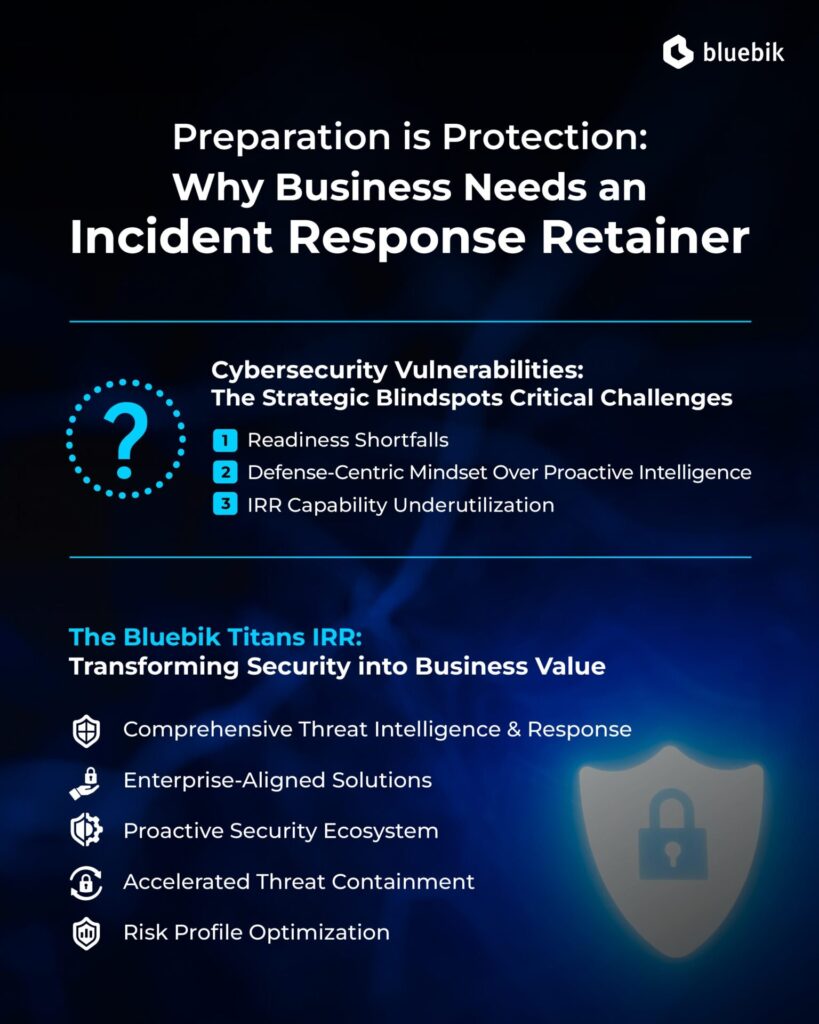Preparation is Protection: Why Business Needs an Incident Response Retainer
The Digital Paradox: Greater Opportunity, Greater Vulnerability
As organizations accelerate digital transformation, they face an inescapable reality: no system is 100% secure. With expanding digital footprints come wider attack surfaces and growing vulnerabilities—challenges that, combined with rapidly evolving cyber threats, have outpaced the capabilities of internal IT departments alone.
The increasing sophistication of cyber-attacks, proliferation of new threat actors, and complexity of managing subsequent impacts establish Incident Response Retainer (IRR) services as an essential capability of businesses. These services empower organizations to effectively counter incidents and mitigate digital risks that could manifest without warning—particularly ransomware attacks and persistent breach attempts. This article explores Incident Response (IR) fundamentals and demonstrates how IRR functions as your trusted business ally when cyber threats emerge.
What is Incident Response?
Incident Response (IR) refers to the structured approach or framework organizations employ to manage and respond to cybersecurity incidents—including malware attacks, system intrusions, data breaches, and other cyber threats that may compromise organizational data, assets, and business operations. The primary objectives of IR are to contain incident impact, minimize network or operational system downtime, and prevent future recurrences.

Why Incident Response Matters to Organizations?
Cyber threats represent one of the most significant challenges in the digital business era, with cyber-attack victims continually increasing alongside the growing number of threat actors. Consequently, IR capabilities are critical for mitigating various business risks in the following ways:
- Reducing Business Impact: Efficient response to incidents such as malware attacks, data breaches, or hacking attempts minimizes potential business consequences—including revenue loss, service disruptions, and reputational damage.
- Protecting Critical Information: Most cyber-attacks target sensitive information such as customer data, financial records, or intellectual property. A robust IR plan helps organizations efficiently identify and prevent data loss.
- Recovery Cost Reduction: Prompt response reduces system downtime and expenses associated with system recovery or remediation of attack-related issues—costs that can escalate significantly without appropriate response measures.
- Ensuring Regulatory Compliance: Many industries face stringent requirements regarding security incident management, including PDPA, GDPR, or ISO/IEC 27001 standards. An IR plan ensures organizational compliance with these requirements, helping avoid penalties or legal proceedings.
- Enhancing Trust and Confidence: Organizations demonstrating effective cyber incident management capabilities showcase preparedness and responsibility to stakeholders—including customers, partners, and employees—strengthening trust and organizational reputation.
- Increasing Organizational Awareness: IR extends beyond incident response to include training and awareness programs for employees, reducing human error risks such as clicking phishing links or setting insecure passwords.
- Preventing Future Incidents: Following an incident, IR facilitates root cause analysis and improvement of preventive measures—including system vulnerability remediation or security policy adjustments—strengthening the organization’s future threat prevention posture.
The Incident Response Assessment: Three Key Areas Requiring Strategic Attention
1. Preparedness Gap
Organizations frequently underestimate the importance of comprehensive incident response planning. When breaches inevitably occur, businesses find themselves at a disadvantage—unable to effectively evaluate and select credible IR service providers, negotiate appropriate service agreements, or understand complex pricing structures. This preparedness gap significantly impairs their ability to respond effectively and minimizes attack impacts.
2. Strategic Imbalance
Most enterprises disproportionately focus on tactical response and recovery capabilities rather than strategic threat intelligence—identifying root vulnerabilities and strengthening cybersecurity standards to prevent recurring attacks. This imbalance between reactive and proactive measures compromises organizational resilience and diminishes effectiveness against increasingly sophisticated cyber threats.
3. Investment Misconception
Many organizations mischaracterize IRR services as speculative expenditures rather than strategic investments because “an attack hasn’t happened yet.” This flawed risk assessment prevents businesses from securing genuinely cost-effective services and implementing appropriate cybersecurity standards tailored to their specific organizational threat profile and operational requirements.
Strategic Advantages: The Bluebik Titans Incident Response Retainer Framework
- Comprehensive Threat Intelligence & Response: Our advance incident response methodology combines thorough threat source investigation with targeted remediation strategies, strengthening organizational resilience while significantly reducing vulnerability to repeated attacks.
- Enterprise-Aligned Solutions: The Bluebik Titans framework customizes its approach to meet the specific security infrastructure, risk profile, and budgetary parameters of each client organization.
- Proactive Security Ecosystem: Moving beyond traditional incident response, our comprehensive services portfolio enables organizations to implement a holistic security posture enhancement program aligned with industry best practices.
- Accelerated Threat Containment: Our pre-established engagement protocols enable rapid incident mobilization, securing critical digital assets and sensitive data within 24 hours via Remote Support or within 48 hours through On-site intervention across all Thailand locations.
- Risk Profile Optimization: Beyond operational benefits, our IRR services deliver tangible financial advantages by qualifying organizations for reduced cyber insurance premiums through demonstrated security readiness.
For a confidential consultation or detailed solution overview, contact our specialized security team:
☎ 02-636-7011












![Thumbnail [Post Event] HOW](https://bluebik.com/wp-content/uploads/2025/12/Thumbnail-Post-Event-HOW.png)